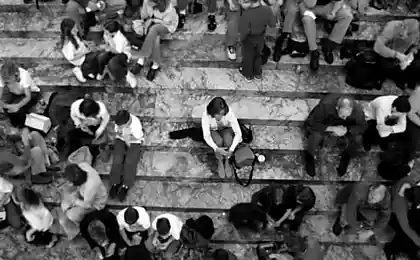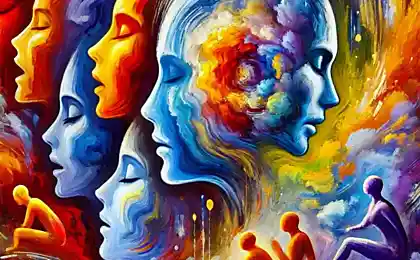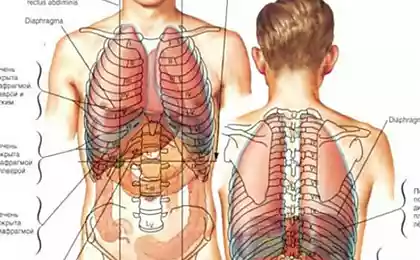328
11 Things You Do Unconsciously When You Feel Lonely

Loneliness is an inevitable part of the human experience, which in the modern world has become a real epidemic. According to research, up to 40% of adults periodically experience feelings of deep loneliness, often without realizing how the condition affects their daily behavior. Our brains, faced with social isolation, trigger self-defense mechanisms that manifest themselves in specific behavioral patterns. Understanding these unconscious reactions is the first step in overcoming the destructive effects of loneliness.
The evolutionary roots of loneliness
The fear of loneliness is deeply rooted in our evolutionary history. For our ancestors, social isolation often meant mortal danger. People outside the group became easy prey for predators and lost access to collective resources. This biological memory persists in us today, causing us to unconsciously respond to loneliness as a threat to survival. As a result, loneliness stimulates the release of stress hormones and triggers a chain of behavioral responses often beyond our conscious control.
According to neuropsychological studies, social pain activates the same areas of the brain as the physical. This explains why the experience of loneliness often feels like real physical pain, and why our bodies seek to eliminate this pain immediately, sometimes resorting to maladaptive strategies.
11 Unconscious Responses to Loneliness
1. Excessive social media activity
When we feel lonely, our social media activity often increases exponentially. We begin to unconsciously seek social confirmation through likes, comments, and virtual communication. Studies show that single people spend 30-45% more time on social networks, but the quality of their interaction there remains superficial.
What to do: Set a timer for using social media. Try to replace passive scrolling with active communication – write a private message to a friend instead of watching the news feed. Use apps that block access to social networks at certain hours to break an unconscious habit.
2. Procrastination and impulsive buying
Loneliness creates an emotional vacuum that we unconsciously seek to fill. Often this is expressed in postponing important things and switching to impulsive consumption - shopping, buying unnecessary gadgets, food or other goods. This gives you a short-term sense of control and pleasure, but then increases the feeling of emptiness.
According to a study by psychologists at the University of Chicago, people with high levels of loneliness spend an average of 18% more on impulse shopping and are more likely to shop online at night.
3. Changing eating habits
Loneliness directly affects our appetite and eating behavior. It manifests itself in two opposite ways: either emotional overeating (especially foods high in sugar and fat) or loss of appetite. The brain looks for the production of dopamine and serotonin, which are lacking due to a lack of social connections, and often finds them in sweet and fatty foods.
What to do: Consciously plan meals. Keep a food diary, noting not only what you eat, but also your emotional state at the time of meals. Ask yourself, “Am I really hungry or am I lacking communication?” ?

4. The personification of inanimate objects
Surprisingly, when we feel lonely, we often begin to unconsciously “animate” the objects around us. We name plants, we talk to appliances, we refer to cars as living things. This phenomenon, known as anthropomorphism, is a defense mechanism of the psyche that compensates for the lack of real human communication.
A study published in Nature found that during periods of forced isolation, people are 42% more likely to attribute human qualities to surrounding objects and technology.
5. Avoiding new social situations
Paradoxically, when we experience loneliness, we often unknowingly avoid the very social situations that might help us overcome isolation. This is due to fear of rejection and social anxiety, which are exacerbated during periods of loneliness. Research suggests that chronic loneliness makes us more alert and inclined to interpret neutral social cues as threatening.
According to psychological research, single people perceive social information selectively, paying more attention to negative social signals and ignoring positive ones. This creates a vicious cycle where loneliness breeds social isolation, which in turn increases loneliness.
6. Excessive immersion in virtual worlds
Video games, TV series, books - lonely people often unconsciously plunge into alternate realities, where they can temporarily forget about their state. Especially attractive are stories with a strong emotional component and well-developed relationships between characters. It is a form of escapism that gives the illusion of social interaction without the risks of real communication.
What to do: Use the fascination with virtual worlds as a bridge to real communication. Join book-loving clubs, series discussion groups, or multiplayer games where you can form real social connections based on shared interests.
7. Increased self-criticism and rumination
In a state of loneliness, the brain often goes into a mode of intense introspection, which often turns into destructive self-criticism. We begin to endlessly chew on past social failures, analyze our shortcomings, and blame ourselves for the lack of strong social ties. This process is called rumination and is one of the unconscious mechanisms that exacerbate both loneliness and associated depressive states.
According to a study conducted by researchers from the University of Pittsburgh, single people spend an average of 67% more time thinking about negative aspects of their personality and behavior than those with strong social ties.
8. Changing speech patterns
Interestingly, during periods of loneliness, our speech changes unconsciously. Studies of linguistic markers show that single people are more likely to use the pronoun “I” instead of “we”, their speech becomes more focused on their own experiences and impressions. In addition, there is a tendency to slower speech and increased pauses between sentences.

9. Excessive fixation on domestic animals
Our pets often become emotional anchors during periods of loneliness. Unconsciously, we begin to attribute human qualities and emotions to them, spend a disproportionate amount of time interacting with them, and even talking to them as human beings. While animal bonding has a therapeutic effect, over-replacing human interaction with pets can exacerbate social isolation.
What to do: Use your pet as a resource, but not as your only source of social contact. Consider joining animal lover communities where you can combine pet care with human interaction.
10. Physical complacency
In a state of loneliness, we unconsciously increase the frequency of touching ourselves – hugging, stroking hands, touching the face. This is due to the fact that tactile contact stimulates the production of oxytocin, the hormone of attachment and trust. When we are deprived of physical contact with other people, the body tries to compensate for this deficit through self-touch.
Researchers from the University of California found that in situations of social isolation, people are 51% more likely to resort to self-embrace and other forms of physical complacency.
11. The distorted perception of time
Loneliness changes our subjective perception of time. The hours seem longer, the days seem slower. This is due to the activation of the amygdala body of the brain associated with the processing of negative emotions, which affects the work of the internal “clock” of the body. As a result, lonely people often lose their sense of daily routine and may suffer from sleep disturbances.
A study by psychologists at Stanford University found that people who experience acute feelings of loneliness are on average 35% worse at assessing time intervals and are more likely to complain of a feeling that “time has stopped.”
How to Transform Unconscious Responses into Conscious Strategies
Awareness of these unconscious patterns is the first step to transforming them. Mindfulness allows you to notice automatic reactions to loneliness and change their direction from destructive to constructive.
- Keep a diary of emotions, noting how feelings of loneliness affect your behavior
- Use the “pause” technique – if you have an impulsive desire, take a deep breath and ask yourself, “What am I really feeling right now?”
- Practice gradual social exposure – start with small and comfortable social interactions, gradually expanding their range.
- Transform Virtual Activity into Real Social Contacts
- Use loneliness as a time for creativity and self-development
Loneliness as an Opportunity for Growth
Recognizing unconscious responses to loneliness is not just a way to get rid of discomfort, but also an opportunity for deep self-discovery and personal growth. Emotional intelligence involves the ability to recognize and manage your own emotional patterns. By understanding how we unknowingly respond to loneliness, we can transform these responses into constructive strategies.
It is important to remember that periodical loneliness is a natural part of the human experience. It becomes a problem only when we allow unconscious reactions to control our lives. A conscious approach to experiencing loneliness helps us use this state as a catalyst to better understand ourselves and create better, more meaningful social connections.
Glossary
Anthropomorphism is the psychological tendency to attribute human qualities and characteristics to non-human entities, including animals, plants, inanimate objects, and natural phenomena.
Rumination is the compulsive thinking of the same thoughts, usually negative or problematic, without moving to a constructive solution.
Escapism is the desire of a person to escape from reality into an imaginary world, avoiding the unpleasant, boring, scary, difficult or banal aspects of everyday life.
Mindfulness is the practice of being consciously present in the present moment, involving full attention to current sensations, thoughts, and the environment without judgment or judgment.
Oxytocin is a neuropeptide and hormone produced by the hypothalamus and secreted by the posterior pituitary gland, often referred to as the “attachment hormone” because of its role in social bonding, trust, and relationship formation.
Social exposure is a psychotherapeutic method in which a person is gradually exposed to social situations that cause anxiety to reduce avoidant behaviors and adapt to these situations.
Emotional intelligence is a person’s ability to recognize emotions, understand the intentions, motivations and desires of others and their own, and manage their own emotions and those of others to solve practical problems.























